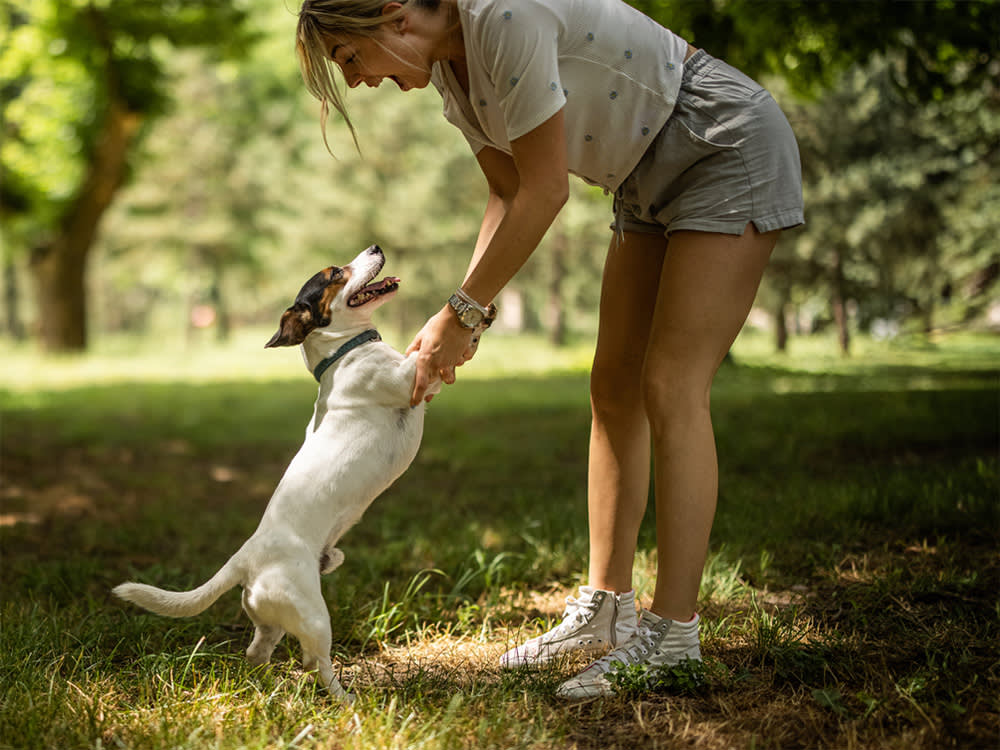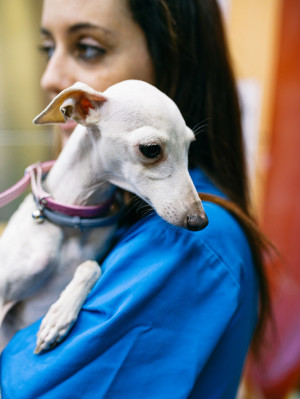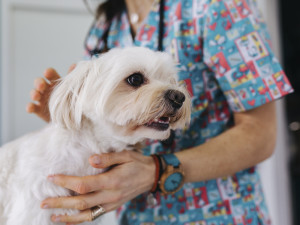A “Last-Ditch Effort” Antibiotic May Help Cure the Mystery Dog Illness
What we know about the antibiotic chloramphenicol.

Share Article
Veterinarians are unsure about what’s causing the mysterious illnessopens in a new tab that has now gotten dogs sick in 16 states — with some of the cases being fatal. Symptoms include coughingopens in a new tab, sneezingopens in a new tab, eye or nose discharge, lethargyopens in a new tab, trouble breathing, and blue or purple gums. But now, there’s hope that vets have found a potential cure.
The antibiotic chloramphenicol has helped several sick dogs get back on their feet. Vets caution that it isn’t a miracle cure, though; the powerful drug is only used in last-resort scenarios for critically ill dogs.

Get (totally free) deals for food, treats, accessories, tech, and way more pet parenting must-haves.
opens in a new tab Veterinarian Dr. James Barr, chief medical officer at BluePearl Pet Hospitalopens in a new tab, warns Kinship that while this drug is being used to treat dogs who are very ill with this respiratory infection, it’s not necessarily the best approach.
“Chloramphenicol is an antibiotic that treats bacterial infections, and it would only work on bacteria that are sensitive to that antibiotic,” he says. “At this moment, we don’t really know the cause of this illness, but it seems like it’s a virus. Viruses don’t respond to antibiotics, so giving an antibiotic for a viral disease is not actually wise and can be detrimental to preserving the efficacy of antibiotics for cases when they are really needed.”
What is chloramphenicol?
Chloramphenicol is a powerful antibiotic that is used for humans and animals alike. In humans, chloramphenicol often comes in ointment form to treat conjunctivitis. According to the American Society of Health-System Pharmacistsopens in a new tab, chloramphenicol can also be taken by mouth or injected to treat meningitis, typhoid fever, cholera, and other illnesses. In dogs, chloramphenicol is used in tablet, capsule, or injectable form for a variety of infectionsopens in a new tab, including bone infections, wound infections, and pneumonia.
Though the mysterious dog illness has been mostly antibiotic-resistant, chloramphenicol has shown promising results, despite thinking to the contrary. One dog parent told Good Morning Americaopens in a new tab that her dog, Ike, spent several days in the hospital with pneumonia after contracting the mysterious dog illness; she was told by vets that it seemed unlikely Ike would survive. That’s when someone suggested chloramphenicol.
“The vet at first was like, ‘Oh, no, no, that's an extremely strong antibiotic, kind of a last-ditch effort antibiotic,’” she told GMA. “And then the internal medicine veterinarian came over and said, ‘No, let’s try it.’” The decision paid off: Within a week, Ike was home and healthy.
Dr. Barr does caution, however, that the drug should still be used as it was for Ike: as a final option. “Chloramphenicol is not innocuous,” he adds. It has side effects for people. It's a drug that I would only use if I had a clear indication for using it. Most veterinarians only use this drug as a last resort.”
Why is chloramphenicol a last-resort drug?
As Dr. Barr notes, most veterinarians prescribe chloramphenicol as a last-resort drug because of its many side effects. The drug can causeopens in a new tab vomiting, diarrhea, and anorexia in dogs. It is more dangerous for dogs with anemia, kidney disease, or liver disease, as well as pregnant dogs.
“Chloramphenicol use in animals is very limited and generally only when a culture indicates it is one of very few remaining options to treat a serious infection,” veterinarian Dr. Molly McAllister told Kinship. She adds that humans must handle the antibiotic with gloves while administering it, because the drug “can induce aplastic anemia, which can be fatal, and people who are pregnant or have liver disease must exercise extreme caution.”
Dr. McAllister stresses that chloramphenicol isn’t a miracle drug. “Until we know more about this canine respiratory illness, there’s no one-size-fits-all approach to treatment,” she says.
Prevention is key
Chloramphenicol is a promising potential solution for very sick dogs, but there are ways to protect your pup before chloramphenicol is needed. Most importantly, dogs should be up-to-date on their vaccinations. Dogs who are vaccinated against other respiratory diseases have more mild cases of the mysterious illness, the Oregon VMA reportsopens in a new tab.
Dogs should not gather in large groups and should not share water sources. If you see a symptomatic dog, you and your pup should steer clear.
Dog parents should exercise extra caution during the holiday season, if possible. “Consider having a pet sitter instead of boarding over the holiday when many boarding facilities might be crowded,” Oregon-based veterinarian Dr. Rachel Warnes told Kinshipopens in a new tab in November. “Stressful situations, such as shelters and boarding facilities, can increase the chance of your pet contracting an illness. When our pets are stressed, their immune system is decreased.”
Dr. Jamie Richardson, the head of veterinary medicine at Small Door Veterinaryopens in a new tab, added that there are some safety precautions pet parents can take if they can’t avoid boarding during travel. “If you do need to board your pet, ensure your boarding facility employs strict hygiene measures including vaccine protocols to ensure all pets are up-to-date with vaccines to minimize spread of known respiratory pathogens,” she said.

Sio Hornbuckle
Sio Hornbuckle is a writer living in New York City with their cat, Toni Collette.

Savannah Admire
Savannah Admire is a writer, poet, and pet mom to three dogs and a cat. She currently lives in Western Maryland. When she’s not writing, you can find her reading, taking photos, or volunteering as a content creator for her local community theatre. Her debut poetry book, Mother Viper, is due out August 12, 2025, and you can follow her on Instagram at @savannahcooperpoetopens in a new tab.
Related articles
![man and lab puppy on park road]() opens in a new tab
opens in a new tabWhen, Exactly, Should You Vaccinate Your Puppy?
If it’s time for a round of shots (no, not that kind), follow this guide.
- opens in a new tab
Does Your Dog Need a Flu Shot?
“Sick as a dog” isn’t just a phrase.
![Staffordshire Bull Terrier panting on grass in profile holding a tennis ball.]() opens in a new tab
opens in a new tabWhy Is My Dog Breathing Heavy?
Don’t panic, but definitely talk to your vet if you’re worried about any of these conditions.
![shy dog frightened in the arms of the owner. this brown mixed-breed hound puppy has a sweet gaze. the female owner has a wool sweater]() opens in a new tab
opens in a new tabWhy is My Dog Shaking? Causes and Treatment
A vet explains why the weather isn’t always to blame.
![Brown terrier dog scratching its ear outdoors]() opens in a new tab
opens in a new tabRelief for Your Dog: Discover Effective Solutions for Their Seasonal Allergies
A vet explains why environmental allergies flare up and what to do about it.
![bandaging dog's bleeding paw]() opens in a new tab
opens in a new tabHow to Care for Your Bleeding Dog
Don’t freak out—here’s what to do.







